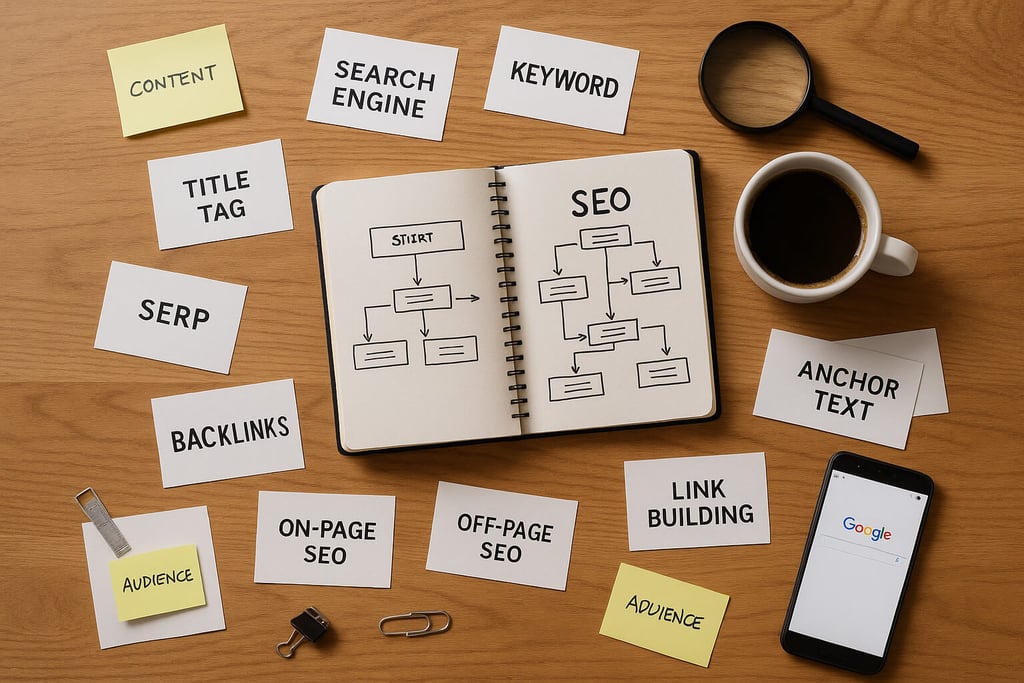SEOJet Flight Blog
SEO Glossary: SEO Terms You Need to Know
Confused by SEO terms? This SEO glossary defines key SEO terms you need to know. Master SEO with our comprehensive list of definitions.
SEO BASICS
Ardene Stoneman
4/6/20255 min read


SEO Glossary of Terms: Understand the Language of Search Engine Optimisation
A strong understanding of SEO terms can give you more control over your website’s visibility and performance.
Whether you're new to SEO or brushing up, knowing the common terminology will help you make better decisions, communicate clearly with SEO experts, and improve your own SEO strategies.
This SEO glossary breaks down the key terms you need to know if you want to influence how your site appears in search engine results.
It’s a plain-English overview of the terms that shape the way websites rank, how search engines like Google interpret content, and how your SEO campaigns are measured.
Quick SEO Glossary: Terms You Need to Know First
If you're new to search engine optimisation or just want a fast reference, this glossary lists the most common SEO terms in one place.
It’s a quick way to get familiar with the language before diving into the deeper explanations below. Bookmark it or scroll back any time you need a reminder.
Article Outline
What Is SEO and Why Do These Terms Matter?
How Do Search Engines Work?
What’s a Keyword in SEO?
What Is the SERP and Why Is It Important?
What Is Anchor Text and Why Should You Care?
How Do Meta Descriptions Influence SEO?
What’s the Difference Between On-Page and Off-Page SEO?
What Are Black Hat and White Hat SEO Techniques?
What’s the Role of Google Tools in SEO?
How Does Content Marketing Support SEO?
1. What Is SEO and Why Do These Terms Matter?
SEO, or search engine optimisation, involves optimising your website so it performs better in search engine results. The aim is to appear in search results when people look for a product or service you offer.
Understanding key SEO terms can make your SEO efforts more efficient. Knowing what a query is or how ranking works saves time and reduces confusion when working with SEO tools or an SEO expert.
These terms you need to know form the foundation of a successful SEO strategy, whether you're running a local business, an online shop, or a blog.
2. How Do Search Engines Work?
A search engine like Google operates by crawling, indexing, and ranking billions of web pages. Search engine crawlers scan the content on your site to understand it. Then Google stores this information in its index and matches it to relevant search queries.
The way your site is interpreted by a search engine affects how high it will rank in search engines. So if you want to appear at the top of the search engine results page, it’s not just about writing content - it’s about helping search engines understand that content properly.
The google algorithm determines what to show users based on relevance, quality, and various SEO tactics.
3. What’s a Keyword in SEO?
A keyword is a word or phrase people type into a search engine to find something. These words reflect search intent, and using them properly in your content on your website is a basic part of on-page SEO.
Good use of keywords can influence your ranking, especially if they’re placed in key areas like headings, the meta description, and anchor text. However, keyword stuffing - overusing them unnaturally - can negatively impact your SEO.
The goal is to use the right search term in the right place. This helps your page appear in search results more reliably and can increase traffic to your website.
4. What Is the SERP and Why Is It Important?
The search engine results page (SERP) is the page users see after entering a query into Google or another search engine. It shows a list of results, some paid (e.g., Google Ads) and some organic search results.
Your position on the results page is known as your ranking. Pages at the top get the most clicks, so every action on your site should be designed to help Google find your most relevant content and increase your google ranking.
Elements like featured snippets, local packs, and knowledge panels also appear in the google search results, especially for local SEO terms and branded searches.
5. What Is Anchor Text and Why Should You Care?
Anchor text is the visible, clickable text in a hyperlink. It helps search engines understand the context of the linked page. For example, a link that says “see our kitchen range” tells Google what the destination page is about.
Choosing the right anchor text supports on-page SEO and sends stronger relevance signals. Overusing the same exact phrase, however, can look manipulative and harm your SEO.
When linking to another website or internal pages, clear, descriptive anchor text improves the experience for the website visitor and adds value to your content.
6. How Do Meta Descriptions Influence SEO?
A meta description is the short summary that appears under your page title in the search engine results page. While it doesn’t directly affect ranking, it strongly influences clicks.
A good meta description includes the target keyword, explains the page's value, and entices users to visit. It’s an important part of SEO best practice that can improve your search result click-through rate.
Think of it as your content’s advert. It tells users - and google and other search engines - why your piece of content is worth clicking on.
7. What’s the Difference Between On-Page and Off-Page SEO?
On-page SEO covers everything you do on your own web page - such as writing content, optimising meta descriptions, improving loading speed, or using correct keywords.
Off-page SEO involves actions taken outside your site, such as earning backlinks from another website, managing social media marketing, or gaining mentions in the press.
Both are part of a healthy SEO campaign. Neglecting one will hold back your ability to appear in search results, especially in competitive industries where strong links and technical work matter.
8. What Are Black Hat and White Hat SEO Techniques?
Black hat SEO includes methods that try to trick search engines, such as cloaking, hidden text, or aggressive keyword stuffing. These can lead to penalties that harm your ability to rank in search engines.
White hat SEO, on the other hand, refers to SEO tactics that follow google’s guidelines. These include quality content, useful internal linking, and structured data - all designed to help google understand and rank your content better.
Most SEO experts recommend sticking to white hat SEO practices if you want long-term results and to build trust with both users and search engines like Google.
9. What’s the Role of Google Tools in SEO?
Several tools provided by Google support SEO efforts. Google Analytics helps track traffic and user behaviour. You can see how users find you, what actions they take, and what content works.
Google Search Console gives data on search queries, ranking, page errors, and crawling issues. It’s also where you can submit sitemaps and monitor your website’s SEO performance.
These tools offer insights that inform how you adapt your SEO strategies, what needs improvement, and where to focus effort to improve your result in Google search.
10. How Does Content Marketing Support SEO?
Content marketing is a core part of modern SEO. Creating helpful, keyword-targeted pages helps your site rank better for relevant topics.
When your content answers a query clearly and includes the right keywords, it’s more likely to perform well in organic search. Search engines prefer pages that are informative and match search intent.
Every piece of content should serve a purpose. Whether it’s a blog post, landing page or FAQ, the aim is to add value for users and help your website’s SEO by increasing relevance and authority.
Summary: Key SEO Terms You Need to Know
SEO stands for search engine optimisation - improving how your site performs in search engines.
A keyword is what people type into a search engine to find information.
Search engine results page (SERP) is where your content competes for clicks.
Anchor text is the visible part of a link, important for context.
Meta descriptions improve click-through rates but don’t directly affect ranking.
On-page SEO is what you do on your own site; off-page SEO happens elsewhere.
White hat SEO is safe and long-term; black hat SEO is risky and often penalised.
Google Analytics and Google Search Console are essential tools provided by Google.
Content marketing helps your site appear at the top of the search engine results page.
Knowing the terms you need to know empowers better SEO decision-making.
Want help making sense of SEO or need hands-on support with your site’s visibility? SEOJet works directly with businesses to improve search rankings with clear, effective strategies based on real SEO strategies.
Services
Contact Us
Newsletter Signup
sales@seojet.co.uk
01934 289 404
© 2025. All rights reserved.


Locations
Weston-super-Mare
Somerset
Bristol
9am - 6pm, Monday to Friday
Suite 2, Unit 7, 12 Beaufigter Rd, Weston-super-Mare, BS24 8EE
